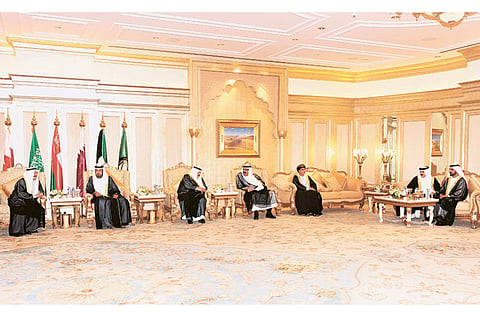GCC monetary union plan will not fly
UAE's opposition to proposed creation of Gulf Central Bank remains firm

Abu Dhabi: The proposed Gulf monetary union will not see any progress during the GCC summit as the UAE, which pulled out of the agreement last year, is not about to change its position on the issue, a top official said on Monday.
At a press conference prior to the opening of the summit, Sultan Bin Nasser Al Suwaidi, Governor of the UAE Central Bank, confirmed that the UAE has no plans to give a green light to the proposed monetary union during the summit.
"We don't think it is the proper time to discuss the UAE going back to the project of the single GCC currency.
"We wish all the best to all GCC countries that have already agreed to join the monetary union.
"We should be more cautious and patient before going ahead with the union. The project is in an advanced stage that needs accurate planning," Al Suwaidi said.
The central bank governor said the monetary union is far from a single currency.
"Unified economic conditions across GCC countries are very important before moving into a single currency," he added.
Moreover, Al Suwaidi said they will not depeg the dirham from the dollar.
"The dirham is pegged to the dollar as up to 70 per cent of our foreign trade is in dollars and a majority of UAE investments are done in dollars."
Alternative currencies
On the other hand, Al Suwaidi said that the yen and euro are the main alternative currencies for the UAE.
"However, the US dollar is the best option to promote our business interests."
The six member countries of the Gulf Cooperation Council planned to introduce a single currency by 2010 and have already taken several steps in this direction.
However, the past year has been marked by doubts over the project and its scheduled deadline. The process has since been delayed.
The UAE last year announced its withdrawal from the monetary union due to disagreement over the location of the future Gulf Central Bank.
Saudi Arabia said it would host the Gulf Central Bank for which the UAE had already tendered its bid.
Trade gateway
The withdrawal of the UAE — the region's trade gateway — from the monetary union was the biggest setback the group had faced since its formation nearly three decades ago.
Oman earlier pulled out of the plan. However, Bahrain, Kuwait, Saudi Arabia and Qatar have remained committed to it. In 2007, Kuwait cut its currency loose from the US dollar, preferring to float its dinar against a basket of currencies. Kuwait's move put it at odds with the other Gulf states, which peg their currencies to the dollar.
Sign up for the Daily Briefing
Get the latest news and updates straight to your inbox


